
We need to be more attentive
When I began to think through what I was going to write for this issue, I focused largely on how best to capture the myriad of activities that have characterized the winter term we are now wrapping up and the imminent arrival of spring. I had jotted down some notes, including what I thought were some appropriately witty or insightful turns of phrase, and took great pleasure in thinking about how I’d comment on the articles in this issue that so nicely epitomize our Faculty.
These words all rang hollow. Last week’s tragic student suicide, coming so soon after another student had taken their life, reminds us just how much more attentive we need to be to mental health within our community and beyond. Penning a celebratory note about Arts just does not feel right, however merited it is. There is plenty of time for that in the future.
Instead, I would just like to encourage everyone to be mindful of themselves and those around them, and to assure everyone, be they staff, faculty, or student, that people care, and that we are committed to helping everyone to find the resources they need. As a reminder, here are some of them:
- Counselling Services walk-in hours, Wednesday and Thursday, 11:30am to 3:30pm, students can see a counsellor for a 90-minute appointment. For students at immediate risk: emergency/same day appointments, Monday to Friday, 8:30am to 4:30pm.
- Health Services emergency service , Monday to Friday, 8:30am to 4:30pm, students will be seen briefly and given a follow-up appointment or referral as appropriate.
- MATES (Mentor Assistance Through Education and Support) is a counselling-based, one-to-one peer support program offered by the Federation of Students (FEDs) and UW Counselling Services. Monday to Friday, 8:30am to 4:30pm. Located in Counselling Services.
- Good2Talk post-secondary students helpline: 1-866-925-5454.
- Waterloo Region emergency contacts.
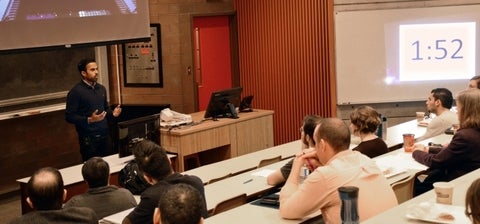
Arts 3 Minute Thesis heats up this year
» Claire Prime, Communications and Graduate Recruitment Officer
Lunch and a full menu of research topics ranging from transgender road narratives to the Franklin Expedition drew a crowd for the Faculty of Arts Three Minute Thesis (3MT) heats. Over two days in February, 22 students from across the Faculty’s grad programs enthralled the lunchtime audiences, along with emcees and judges composed of alumni, faculty and staff members. Two students, Andria Bianchi and Joseph Buscemi, went on to the university-level finals, where Bianchi was awarded the runner-up prize. Read on about the winning 3MT presentations.
Surviving the Worst: Cultures in Crisis at the End of the Cold War
Joseph Buscemi, a PhD student in the Department of History, won the first day of competition. He had the audience laughing with his description of Protect and Survive, Britain’s “hauntingly useless” Civil War-era public nuclear defence program. Produced in the late 1970s and early ‘80s, the series of pamphlets, radio broadcasts and films was intended to teach citizens how to protect themselves during a nuclear attack.
When Buscemi began studying Protect and Survive, the program’s documents had only recently been declassified and no books and only a few articles had been written about it. He went to the U.K. to find out more. He learned the program was the work of a group of civil servants put in charge of protecting 55 million people from nuclear war with only a few million pounds.
Sex, Dementia and Consent
Andria Bianchi, a PhD student in the Department of Philosophy, won the second day of competition at the arts heat and the runner-up prize at the university-level competition. She spoke about the challenges of establishing sexual consent when one or both partners have dementia. By 2030, 75 million people will be diagnosed with dementia and many of them will be sexually active, she said.
Currently, most institutions do not have policies in place on sexual consent for patients with dementia. Bianchi proposed three possible approaches to the problem. First, decisions can be made based on the patient’s prior wishes and values. Second, family members and clinicians can try to enable and support a patient to make their own autonomous decisions. Lastly, the idea of consent can be dismissed entirely in this population with a focus instead on individual happiness and pleasure.
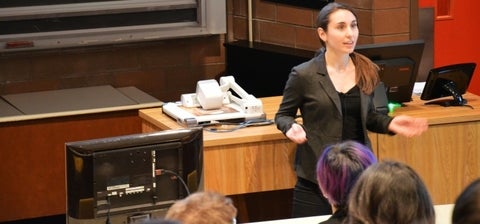
Andria Bianchi presented her research at Arts 3MT heat in February and went on to become UWaterloo's 3MT runner up.
Congratulations to all the 2017 Arts 3MT competitors
- Sajad Abdallah, Philosophy (supervisor: Shannon Dea) The Evolution of Reason
- Andria Bianchi, Philosophy (supervisor: Patricia Marino) Sex, Dementia and Consent
- Joseph Andrew Buscemi, History (supervisor: Daniel Gorman) Surviving the Worst: Cultures in Crisis at the End of the Cold War
- Ryan Carroll, Germanic and Slavic Studies (supervisor: Grit Liebscher) Challenging Identities
- Evelyn Deshane, English Language and Literature (supervisor: Gordon Slethaug) Wish You Were Here: Transgender Road Narratives and the Place of Identity
- Sara Gallagher, English Language and Literature (supervisor: Victoria Lamont) Transacted Destinies, Segregated Histories
- Emily Grant, Psychology (supervisor: Colin Ellard) Is Green Enough?
- Nicholas Hobin, English Language and Literature (supervisor: Neil Randall) Beast Machines: Real Animals in Virtual Worlds
- Zabeen Khamisa, Religious Studies (supervisor: Doris Jakobsch) A Generation of Change Makers: The Entrepreneurial Spirit of Millennial Sikhs in Canada
- Robin Mazumder, Psychology (supervisor: Colin Ellard) The Downside of Building Up: An Exploration into the Psychological Impacts of Exposure to Skyscrapers in Urban Centres
- David Meinen, Balsillie School of International Affairs (supervisor: Suzan Ilcan) The Future (for) ‘Climate Refugees’: Migration and Fear in a Warming World
- Chris Miller, Religious Studies (supervisor: Doug Cowan) Entering the Academy
- Sebastian Murdoch-Gibson, Balsillie School of International Affairs (supervisor: Suzan Ilcan) Relief Sovereignty and the Syrian Civil War
- Saeed Sabzian, English Language and Literature (supervisor: Randy Harris) A Triangulated Regime of Studying the Culture of Fear
- Samuel Schirm, Germanic and Slavic Studies (supervisor: Emma Betz) Talking About Going Abroad and Coming Back: Language Learning During Study Abroad
- Yusuf Sholeye, History (supervisor: Daniel Gorman) A History of Territorial Boundary Dispute in Africa and its Impact on Sociopolitical Development
- Alexander Sullivan, Germanic and Slavic Studies (supervisor: Barbara Schmenk) Motivation and Multilingual Learners of German
- Erica Swyers, Germanic and Slavic Studies (supervisor: Barbara Schmenk) Learning Language with Lego
- Dana Thacher, Anthropology (supervisor: Robert Park) Of Wood and Metal: New Stories from the Franklin Expedition
- Mengran Xu, Psychology (supervisor: Christine Purdon) To Avoid or to Approach: Understanding Anxiety Through the Construct of Ambivalence
- Nick Zabara, Psychology (supervisor: David A. Moscovitch) Can Trying to Feel Safe be a Trap if You are Already Anxious?
- Mona Zhu, Psychology (supervisor: Evan Risko) The Space Detective and the Creatures of Habit

Indigenous Speaker Series: moving forward together
» Susan Roy, Assistant Professor, Department of History
The Faculty of Arts and the Waterloo Aboriginal Education Centre (WAEC) are co-sponsoring a new Indigenous Speakers Series highlighting the voices of Indigenous artists, writers, activists, and leaders from across Turtle Island. The series offers UWaterloo students, faculty and staff opportunities to learn from, understand and engage with Indigenous issues.
Along with a number of recent collaborative initiatives between Arts and WAEC, the speaker series represents a growing commitment to Indigenous issues and to the important work that WAEC does on campus and in the community.
Phil Monture of the Six Nations of the Grand River gave the first talk in the series on February 28. He spoke about the history of land alienations from the Haldimand Tract, land promised in 1784 to Six Nations, which includes six miles on each side of the Grand River. He also spoke of the legal efforts that Six Nations has undertaken - through court actions, negotiations, and at the United Nations - to reach a resolution to these dispossessions and to develop better relationships with Canada.
We invited Phil to be our first speaker as he has contributed much to our understanding of this history, and has visited many of my Indigenous history classes over the past few years. This history is of direct relevance to us on campus as the University of Waterloo sits on the traditional territory of the Attawandaron (Neutral), Anishnaabeg, and Haudenosaunee peoples and on Lot 2 of the Haldimand Tract.
On March 29 Sylvia McAdam, co-founder of the Idle No More movement, will give the second talk in the Indigenous Speaker Series entitled Nationhood Interrupted: Revitalizing nêhiyaw Legal Systems. Sylvia will also be at the Waterloo Aboriginal Education Centre for its famous Soup and Bannock lunch on Thursday March 30 providing students an opportunity to meet with her.
The Indigenous Speaker Series is organized by Shawn Johnston (WAEC Events Coordinator), Linda Warley (Professor of English and Assoc. Dean, Graduate Studies), and myself. We welcome suggestions for future speakers - contact me at susan.roy@uwaterloo.ca.
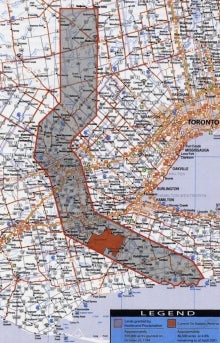
Moving forward together
Since I joined UWaterloo in 2012, there has been an increasing interest in and awareness of Indigenous issues on campus. For example, more events begin with territorial acknowledgement highlighting the Indigenous lands on which UWaterloo is located, and the Truth and Reconciliation Response Projects website launched last summer as a hub for projects and dissemination. In fall 2016, Indigenous activist and academic Cindy Blackstock was the recipient of the honorary Doctor of Laws degree and addressed Arts convocation.
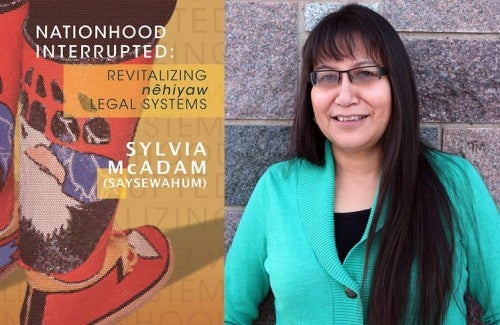
These initiatives are largely influenced by the Truth and Reconciliation Commission’s (TRC) recent report – and more specifically, the TRC’s Calls to Action directed to post-secondary institutions, which you can read below.
Many of the initiatives are also driven by the vision and leadership provided by WAEC, where students and staff work to raise awareness about Indigenous issues and to broaden and deepen relationships across the campus and in the wider community. Their work pushes all of us at Waterloo toward building a more inclusive and joyous community.
As a space on campus dedicated to Indigenous issues, many look to WAEC for guidance and leadership. The Faculty of Arts and the University have an opportunity to develop a strategic plan in collaboration with WAEC and Indigenous students, leaders, and communities on campus and beyond. As many have pointed out, the plan could, for example, offer a growing range of courses including Indigenous languages courses, support research, support student success, hire Indigenous staff and faculty, develop programs in collaboration with Indigenous leaders and communities, and make our campus reflect the cultural and historical perspectives of Indigenous peoples.
The TRC’s Calls to Action have made it clear that post-secondary institutions have a responsibility to support Indigenous students and communities.
As a university, we have much work ahead to integrate Indigenous issues and worldviews more fully into our institution and to work towards reconciliation, restitution and decolonization. We look forward to continuing this important work together.
The TRC made education a focus by including the following specific calls to action:
- We call upon the federal government to provide adequate funding to end the backlog of First Nations students seeking a post-secondary education (Call to Action 11).
- We call upon the federal, provincial, territorial, and Aboriginal governments to develop culturally appropriate early childhood education programs for Aboriginal families (Call to Action 12).
- We call upon post-secondary institutions to create university and college degree and diploma programs in Aboriginal languages (Call to Action 16).
- We call upon medical and nursing schools in Canada to require all students to take a course dealing with Aboriginal health issues, including the history and legacy of residential schools, the United Nations Declaration on the Rights of Indigenous Peoples, Treaties and Aboriginal rights, and Indigenous teachings and practices. This will require skills-based training in intercultural competency, conflict resolution, human rights, and anti-racism (Call to Action 24).
- We call upon the federal, provincial, and territorial governments, in consultation and collaboration with Survivors, Aboriginal peoples, and educators, to: i. Make age-appropriate curriculum on residential schools, Treaties, and Aboriginal peoples’ historical and contemporary contributions to Canada a mandatory education requirement for Kindergarten to Grade Twelve students. ii. Provide the necessary funding to post-secondary institutions to educate teachers on how to integrate Indigenous knowledge and teaching methods into classrooms (Call to Action 62).
- We call upon the federal government, through the Social Sciences and Humanities Research Council, and in collaboration with Aboriginal peoples, post-secondary institutions and educators, and the National Centre for Truth and Reconciliation and its partner institutions, to establish a national research program with multi-year funding to advance understanding of reconciliation (Call to Action 65).
- We call upon Canadian journalism programs and media schools to require education for all students on the history of Aboriginal peoples, including the history and legacy of residential schools, the United Nations Declaration on the Rights of Indigenous Peoples, Treaties and Aboriginal rights, Indigenous law, and Aboriginal-Crown relations (Call to Action 86).
Arts Research Collision Day
Building corporate-research partnerships in the social sciences, humanities and creative arts at the University of Waterloo
» Camelia Nunez, Manager, Corporate Research Partnerships, Office of Research
In Canada and globally the knowledge economy is increasingly a key driver of prosperity as societal and environmental challenges grow more urgent, and international competitive pressure is becoming more intense. No one part or group of society has the knowledge or resources to tackle these challenges on alone. This is a time that calls for effective collaboration among all different actors in society, including university research collaboration with industry.
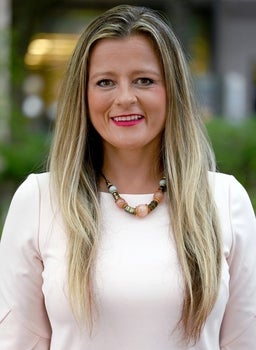
During the 2015-2016 fiscal year at the University of Waterloo, industry and industry-leveraged contributions to faculty research amounted to a remarkable $40 million. The Research Partnerships team in the Office of Research manages these contracts, while developing new industrial relationships through its full-time corporate liaison staff. The Research Partnerships unit in the Office of Research has built a team of experts to assist in the development of private-sector research partnerships across all types research in the institution.
In my role as one of the four corporate research partnerships managers, my main responsibility is to work closely with the Faculty of Arts, developing a strong understanding of Arts research activity and individual researchers’ interests in putting their knowledge to work through research collaborations with corporate or private partners. Along with my colleagues, I am able to bring relevant social sciences and humanities research into conversations with companies across all industries.
In the spirit of building research partnerships, faculty members are invited to participate in the Arts Research Collision event that will take place on April 25th at THEMUSEUM in downtown Kitchener. Participants will meet with local companies, learn about some of the questions and challenges they are currently facing and set the stage for future collaborations.
We are grateful for the support of SSHRC and Mitacs in the organization of Arts Research Collision event.
I welcome the opportunity to engage with researchers in the Faculty of Arts, and invite you to reach out to me with any questions or ideas. Please contact me at cnunez@uwaterloo.ca | ext. 38022
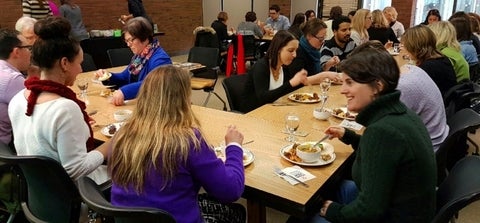
Green Grazing Lunch (not just for cows)
Earlier this winter term, the Arts Green Office Team cooked-up and hosted a community lunchtime event that was a great success with more than 50 people dining and ruminating on delicious plant-based dishes.
The event was intended to highlight how tasty and fun plant based dishes can be. As you may know, animal agriculture requires a lot of resources and energy, more so than plant agriculture. By introducing more plant-based dishes into your shopping, cooking and diet routine, you can reduce your carbon footprint.
The Green Grazing Lunch transformed HH373 from a serious meeting and seminar room (e.g. Arts Faculty Council) to a lively, communal dining room. It was also quite civilized: real cutlery and ceramic dishes were provided, thanks to one-time funding from the Dean of Arts Office, to help ensure the Green Office/UWaterloo Sustainability event was waste-free.
The array of people (staff and faculty from across Arts) matched the array of wonderful dishes -- while supporting a great cause. I am a big fan!
More grazing to come
Oh, did you miss the February 1st Green Grazing Lunch? Sorry about that (note, we did invite all faculty and staff via email lists). But don’t worry, as plans are in the cooker for another event in the spring term – date to be announced. This time we will invite potluck contributions, and it will be bring-your-own-nondisposable-dishes (BYOND). Below are recipes and links for some of the featured vegan and vegetarian foods on the buffet table.
Green grazing lunch
Lentil balls, quinoa tacos
Thank you colleagues, YUM!
Grazing at home, anytime
Here are some of the recipes Arts Green Office Team members prepared and shared at the Green Grazing Lunch - try them at home, and start planning your contribution for the next lunch:
- Butternut Sweet Potato and Red Lentil Stew (from Oh She Glows) Can use small white beans instead of lentils
- Sweet and Sour Lentil Balls: Lentil balls (from Thug Kitchen) and Sweet and Sour Sauce (from Family Fresh Meals)
- Grilled Veggie Couscous Salad (from Thug Kitchen)
- Buffalo Cauliflower Wings (from Gimme Delicious) Served with yoghurt-dill dip
- Vegan Quinoa Tacos with Mango-Avocado Salsa (from Minimalist Baker)
- Granola Nut Clusters (from Oh She Glows)
- Peanut Butter Balls (from Oh She Glows)
Did you know? To date, three units in the Faculty of Arts are Green Office certified: both the Dean of Arts Office and the Arts Undergraduate Office are Silver certified; and Psychology is Bronze certified. Political Science is poised to earn their Bronze certification soon.
Comments? Questions?If you have any comments or questions about the Green Grazing Lunch, or any other Green Office initiative, please visit our website, or contact any of us on the Arts Green Office Team: Jessica Debrouwer, Marina Ivanova (Chair), Emily Mininger, Wendy Philpott, Juli-Ann Sannuto, Taryn Stutz. (Additional team members welcome!)
More stories and information
- The Arts Advancement team recently published the Winter 2017 issue of Arts & Letters, the biannual publication for alumni and friends.
- Our HeForShe Faculty Advocates have announced the Arts HeForShe Travel Award, available to students, staff and faculty travelling to conferences, training or other events focused on gender equity. The deadline is April 14, 2017.
- Over the 2016-17 academic year, the University's central and faculty-based marketing and communications teams have been rolling-out the updated and refined UWaterloo brand. The refinement includes look-and-feel and core messaging intended to represent and differentiate this institution. The brand refinement roll-out includes updated websites (such as this Arts website), redesigned print publications, and items faculty and staff members often use, such letterhead and Powerpoint. Visit the Brand website to learn more about the refinement and to access communication guidelines and useful resources and downloads.
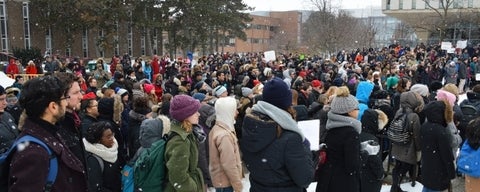
#WeAreAllUWaterloo. Several hundred campus community members gathered in the Arts Quad on January 31 for a rally and vigil in response to the Quebec City mosque attack. The rally was organized by members of the Dept. of English Language and Literature, the Muslim Students Association, with support and opening ceremony by the Waterloo Aboriginal Education Centre.
Feedback?
Inside Arts is published each term. Comments, ideas, and submissions are always welcome. Please contact Wendy Philpott.